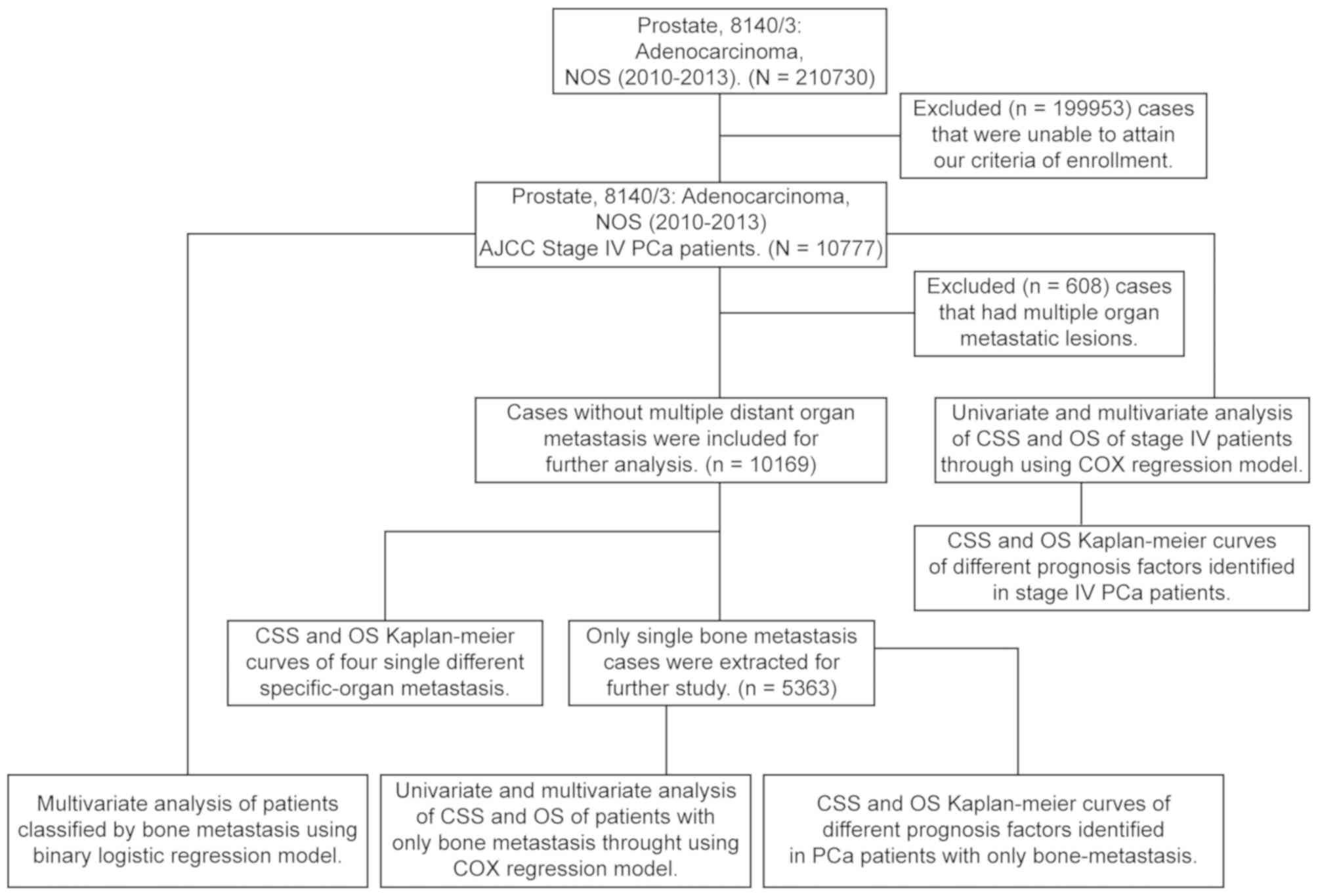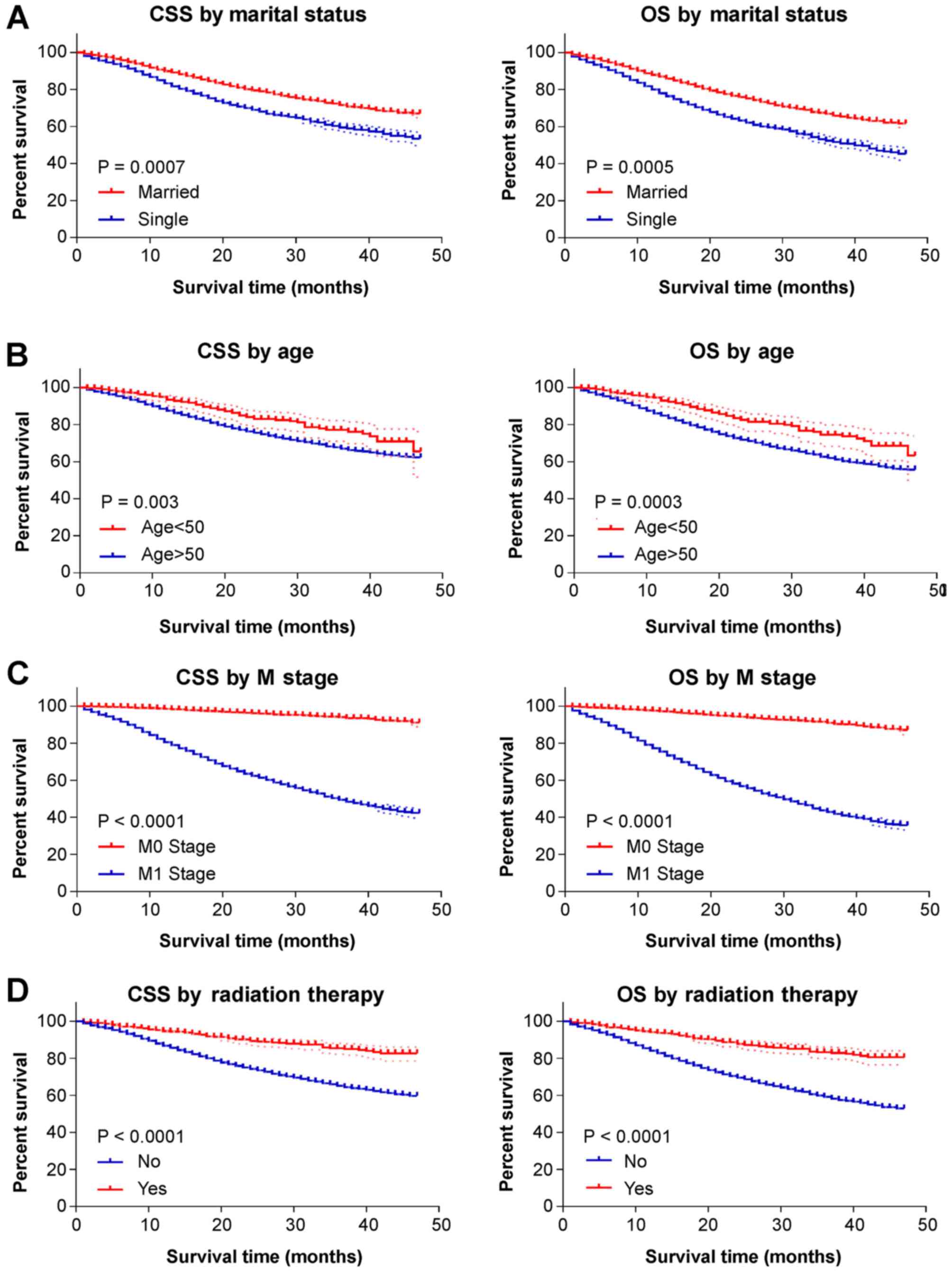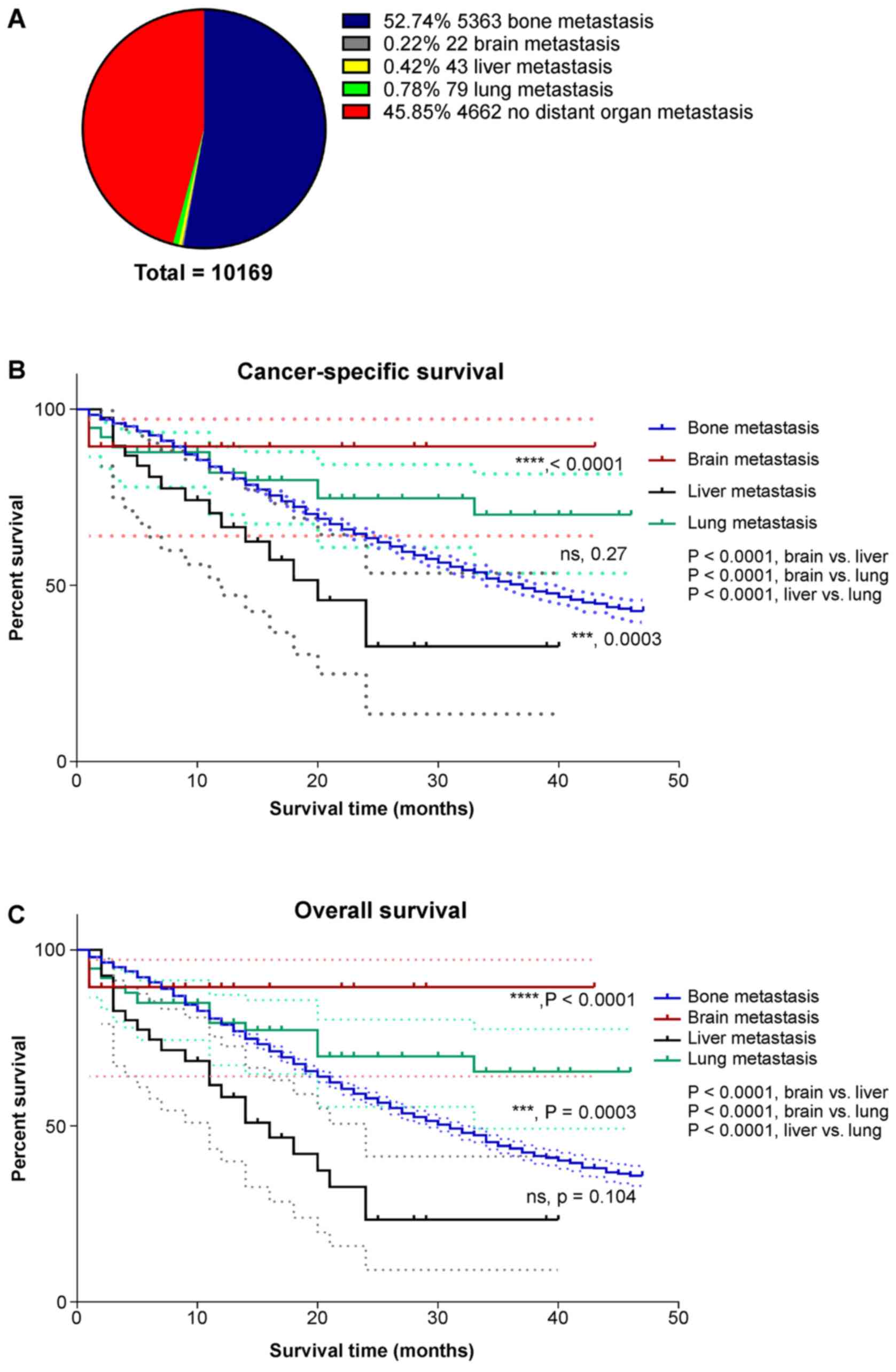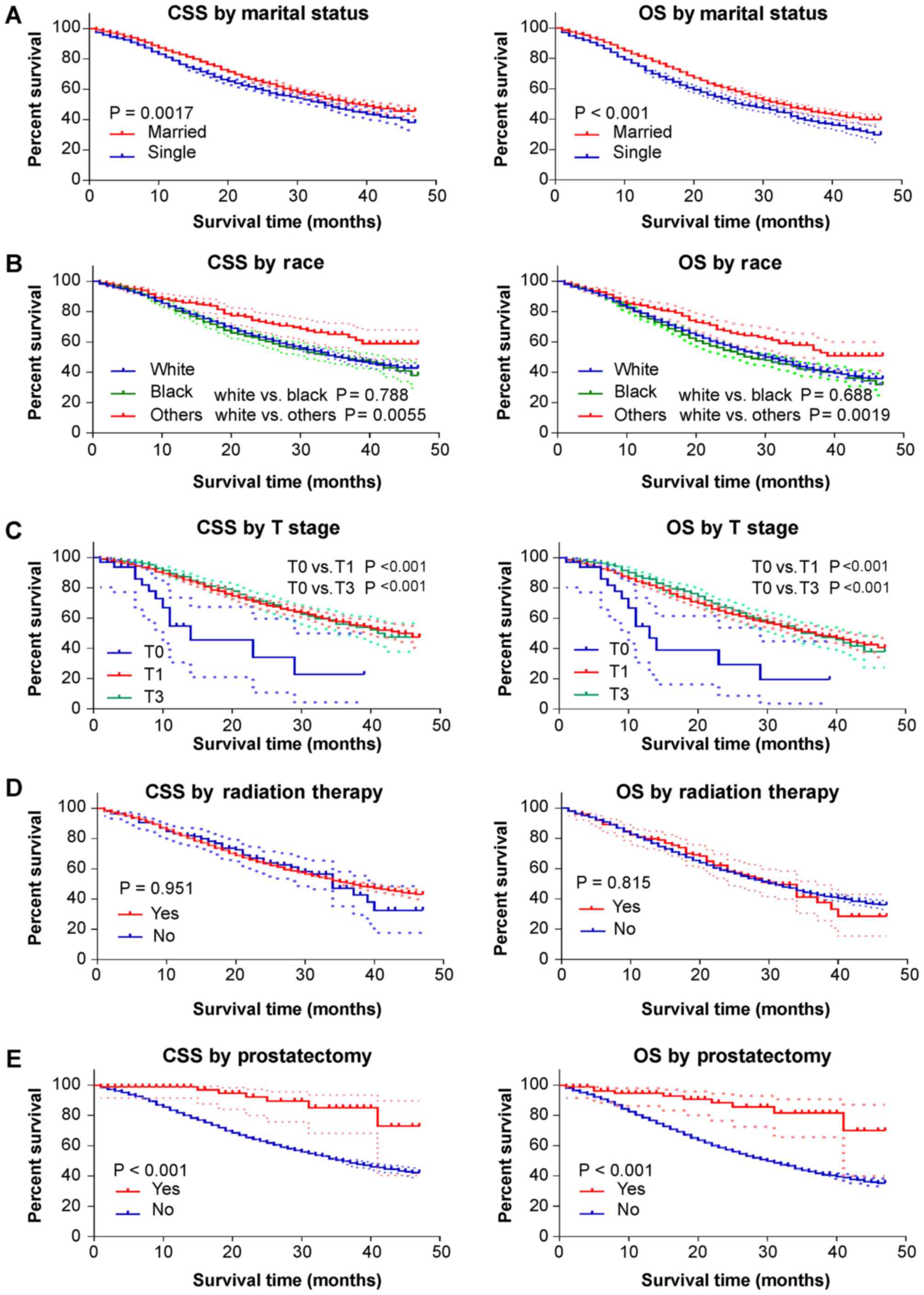|
1
|
Siegel RL, Miller KD and Jemal A: Cancer
statistics, 2017. CA Cancer J Clin. 67:7–30. 2017. View Article : Google Scholar : PubMed/NCBI
|
|
2
|
Yamada Y, Naruse K, Nakamura K, Taki T,
Tobiume M, Zennami K, Nishikawa G, Itoh Y, Muramatsu Y, Nanaura H,
et al: Investigation of risk factors for prostate cancer patients
with bone metastasis based on clinical data. Exp Ther Med.
1:635–639. 2010. View Article : Google Scholar : PubMed/NCBI
|
|
3
|
Heidenreich A, Bellmunt J, Bolla M, Joniau
S, Mason M, Matveev V, Mottet N, Schmid HP, van der Kwast T, Wiegel
T, et al: EAU guidelines on prostate cancer. Part 1: Screening,
diagnosis, and treatment of clinically localised disease. Eur Urol.
59:61–71. 2011. View Article : Google Scholar : PubMed/NCBI
|
|
4
|
Yang L, Drake BF and Colditz GA: Obesity
and other cancers. J Clin Oncol. 34:4231–4237. 2016. View Article : Google Scholar : PubMed/NCBI
|
|
5
|
Humphrey PA: Histopathology of prostate
cancer. Cold Spring Harb Perspect Med. 7:a0304112017. View Article : Google Scholar : PubMed/NCBI
|
|
6
|
Bill-Axelson A, Holmberg L, Filén F, Ruutu
M, Garmo H, Busch C, Nordling S, Häggman M, Andersson SO, Bratell
S, et al: Radical prostatectomy versus watchful waiting in
localized prostate cancer: The Scandinavian prostate cancer group-4
randomized trial. J Natl Cancer Inst. 100:1144–1154. 2008.
View Article : Google Scholar : PubMed/NCBI
|
|
7
|
Veeratterapillay R, Goonewardene SS,
Barclay J, Persad R and Bach C: Radical prostatectomy for locally
advanced and metastatic prostate cancer. Ann R Coll Surg Engl.
99:259–264. 2017. View Article : Google Scholar : PubMed/NCBI
|
|
8
|
Culp SH, Schellhammer PF and Williams MB:
Might men diagnosed with metastatic prostate cancer benefit from
definitive treatment of the primary tumor? A SEER-based study. Eur
Urol. 65:1058–1066. 2014. View Article : Google Scholar : PubMed/NCBI
|
|
9
|
Stephen B, David R, Carolyn C and April G:
AJCC cancer staging manual seventh edition. Am Joint Committee
Cancer. 2010, https://cancerstaging.org/references-tools/deskreferences/Pages/default.aspxAugust
29–2017
|
|
10
|
Adamo M, Dickie L and Ruhl J: SEER program
coding and staging manual 2016. National Cancer Institute;
Bethesda, MD 20850-9765, U.S.: Department of Health and Human
Services National Institutes of Health National Cancer Institute, .
2016, https://seer.cancer.gov/tools/codingmanuals/historical.htmlAugust
29–2017
|
|
11
|
Fisher LD and Lin DY: Time-dependent
covariates in the Cox proportional-hazards regression model. Annu
Rev Public Health. 20:145–157. 1999. View Article : Google Scholar : PubMed/NCBI
|
|
12
|
Freedland SJ, Partin AW, Humphreys EB,
Mangold LA and Walsh PC: Radical prostatectomy for clinical stage
T3a disease. Cancer. 109:1273–1278. 2007. View Article : Google Scholar : PubMed/NCBI
|
|
13
|
Heng DY, Wells JC, Rini BI, Beuselinck B,
Lee JL, Knox JJ, Bjarnason GA, Pal SK, Kollmannsberger CK, Yuasa T,
et al: Cytoreductive nephrectomy in patients with synchronous
metastases from renal cell carcinoma: Results from the
international metastatic renal cell carcinoma database consortium.
Eur Urol. 66:704–710. 2014. View Article : Google Scholar : PubMed/NCBI
|
|
14
|
Keutgen XM, Nilubol N, Glanville J,
Sadowski SM, Liewehr DJ, Venzon DJ, Steinberg SM and Kebebew E:
Resection of primary tumor site is associated with prolonged
survival in metastatic nonfunctioning pancreatic neuroendocrine
tumors. Surgery. 159:311–318. 2016. View Article : Google Scholar : PubMed/NCBI
|
|
15
|
Hüttner FJ, Schneider L, Tarantino I,
Warschkow R, Schmied BM, Hackert T, Diener MK, Büchler MW and
Ulrich A: Palliative resection of the primary tumor in 442
metastasized neuroendocrine tumors of the pancreas: A
population-based, propensity score-matched survival analysis.
Langenbecks Arch Surg. 400:715–723. 2015. View Article : Google Scholar : PubMed/NCBI
|
|
16
|
Abdel-Rahman O: Role of liver-directed
local tumor therapy in the management of hepatocellular carcinoma
with extrahepatic metastases: A SEER database analysis. Expert Rev
Gastroenterol Hepatol. 11:183–189. 2017. View Article : Google Scholar : PubMed/NCBI
|
|
17
|
Abou-Alfa GK and Venook AP: The impact of
new data in the treatment of advanced hepatocellular carcinoma.
Curr Oncol Rep. 10:199–205. 2008. View Article : Google Scholar : PubMed/NCBI
|
|
18
|
Oweira H, Petrausch U, Helbling D, Schmidt
J, Mannhart M, Mehrabi A, Schöb O, Giryes A, Decker M and
Abdel-Rahman O: Prognostic value of site-specific metastases in
pancreatic adenocarcinoma: A surveillance epidemiology and end
results database analysis. World J Gastroenterol. 23:1872–1880.
2017. View Article : Google Scholar : PubMed/NCBI
|
|
19
|
Shien T, Nakamura K, Shibata T, Kinoshita
T, Aogi K, Fujisawa T, Masuda N, Inoue K, Fukuda H and Iwata H: A
randomized controlled trial comparing primary tumour resection plus
systemic therapy with systemic therapy alone in metastatic breast
cancer (PRIM-BC): Japan Clinical Oncology Group Study JCOG1017. Jpn
J Clin Oncol. 42:970–973. 2012. View Article : Google Scholar : PubMed/NCBI
|
|
20
|
Ruiterkamp J, Voogd AC, Tjan-Heijnen VC,
Bosscha K, van der Linden YM, Rutgers EJ, Boven E, van der Sangen
MJ and Ernst MF; Dutch Breast Cancer Trialists' Group (BOOG), :
SUBMIT: Systemic therapy with or without up front surgery of the
primary tumor in breast cancer patients with distant metastases at
initial presentation. BMC Surg. 12:52012. View Article : Google Scholar : PubMed/NCBI
|
|
21
|
Fields RC, Jeffe DB, Trinkaus K, Zhang Q,
Arthur C, Aft R, Dietz JR, Eberlein TJ, Gillanders WE and
Margenthaler JA: Surgical resection of the primary tumor is
associated with increased long-term survival in patients with stage
IV breast cancer after controlling for site of metastasis. Ann Surg
Oncol. 14:3345–3351. 2007. View Article : Google Scholar : PubMed/NCBI
|
|
22
|
Comen E, Norton L and Massagué J: Clinical
implications of cancer self-seeding. Nat Rev Clin Oncol. 8:369–377.
2011. View Article : Google Scholar : PubMed/NCBI
|
|
23
|
Norton L: Cancer stem cells, self-seeding,
and decremented exponential growth: Theoretical and clinical
implications. Breast Dis. 29:27–36. 2008. View Article : Google Scholar : PubMed/NCBI
|
|
24
|
Resel Folkersma L, San José Manso L,
Galante Romo I, Moreno Sierra J and Olivier Gómez C: Prognostic
significance of circulating tumor cell count in patients with
metastatic hormone-sensitive prostate cancer. Urology.
80:1328–1332. 2012. View Article : Google Scholar : PubMed/NCBI
|
|
25
|
Cooperberg MR, Broering JM and Carroll PR:
Risk assessment for prostate cancer metastasis and mortality at the
time of diagnosis. J Natl Cancer Inst. 101:878–887. 2009.
View Article : Google Scholar : PubMed/NCBI
|
|
26
|
Cook MM, Rosenberg PS, McCarty FA, Wu M,
King J, Eheman C and Anderson WF: Racial disparities in prostate
cancer incidence rates by census division in the United States,
1999–2008. Prostate. 75:758–763. 2015. View Article : Google Scholar : PubMed/NCBI
|
|
27
|
Brawley OW, Jani AB and Master V: Prostate
cancer and race. Curr Probl Cancer. 31:211–225. 2007. View Article : Google Scholar : PubMed/NCBI
|
|
28
|
Guo X, Zhang C, Guo Q, Xu Y, Feng G, Li L,
Han X, Lu F, Ma Y, Wang X and Wang G: The homogeneous and
heterogeneous risk factors for the morbidity and prognosis of bone
metastasis in patients with prostate cancer. Cancer Manag Res.
10:1639–1646. 2018. View Article : Google Scholar : PubMed/NCBI
|


















